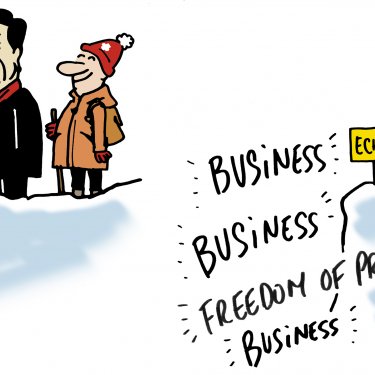Press freedom predator given Davos platform

Reporters Without Borders (RSF) regrets that the World Economic Forum, which brings government leaders and big businessmen together in the Swiss resort of Davos, is lending itself as a platform to Chinese President Xi Jinping without any heed to the human rights situation in his country.
Xi’s participation in the four-day forum, which begins today, is unprecedented. As well as being the Chinese Communist Party’s general secretary, he also heads the Cyberspace Administration of China (CAC), which is in charge of censoring the Internet and preparing the propaganda that is distributed online.
He is accompanied by such Internet giants as Jack Ma, the executive chairman of the Alibaba Group, who recently acquired Hong Kong’s leading English-language newspaper, the South China Morning Post, and Zhang Yaqing, the CEO of the Chinese search engine Baidu, Beijing’s leading censorship tool. Li Ruigang, the chairman of Media Capital and owner of other Hong Kong media outlets, is also among the media and communication leaders accompanying him.
Forum organizer Klaus Schwab said “dialogue” is to be one of the watchwords of this year’s event and Swiss Confederation President Doris Leuthard described China as a “model of development” while refering to the importance of “education” and stressing that “digitalization must be democratized like knowledge was democratized through the printing press.”
“It is regrettable that the Davos forum is providing a platform to a dictator in such a laudatory manner when human rights are being suppressed more in China now than they have for the past two decades,” said Benjamin Ismaïl, the head of RSF’s Asia-Pacific desk.
“How can these comments be regarded as sincere when freedom of the press, information and expression are missing from any dialogue with China? How can China be regarded as a development model when its censors permit no public debate about its environmental problems, and when the Chinese education system, the state media and Internet companies erase events such as the Tiananmen Square massacre from Chinese history, thereby keeping most of the public in ignorance?”
In his opening address, President Xi warned against the “excessive chase of profit” and the dangers of a globalization that did not try to benefit all countries. He also told political leaders that it was pointless to fear problems and that they should “face” them instead.
RSF’s Ismaïl added: “Xi’s address unintentionally told the international community what attitude it should adopt toward China in the absence of any improvement in its respect for fundamental freedoms. Political and business leaders must end their long silence about Chinese censorship, which affects economic development in both China and the rest of the world.”
What won’t be discussed in Davos:
Added to RSF’s list of press freedom predators as soon as he became president, Xi is the world’s leading censor in terms of the number of Internet users denied access to information that is freely and independently reported and critical of the government.
He is also the initiator of a policy aimed at securing hegemonic control over news and information and establishing a world media order heavily influenced by China. Last April, an RSF report entitled “Beijing’s invisible hand on Hong Kong’s media” described the threats to media freedom in the “Special Administrative Region.”
The Chinese authorities implement press censorship by issuing very strict directives to media outlets and by keeping tight control on coverage of pro-democracy movements. Reprisals against information activists, journalists and bloggers are currently being intensified and have turned China into the world’s biggest prison for news and information providers, with more than 100 journalists and cyber-dissidents currently detained. They include the well-known journalist Gao Yu.
Three citizen journalists and RSF Press Freedom Prize winners – Lu Yuyu, Li Tingyu and Huang Qi (the editor of the human rights information website 64Tianwang) – were jailed in 2016 just for covering events that were thought to reflect badly on the Communist Party.
China has devised one of the world’s most sophisticated systems of online censorship and surveillance and continues to be on RSF’s list of “enemies of the Internet.” Cut off from the rest of the world, Xinjiang and Tibet continue to be information “black holes” where Internet access is highly controlled or non-existent. The authorities also keep the foreign press under close watch.
RSF urged leaders attending the G20 summit in the southeastern city of Hangzhou last September to end their silence about the decline in justice in China, which is increasingly using forced confessions to justify the imprisonment of information activists and all those who criticize Xi and the Communist Party.
China is ranked 176th out of 180 countries in RSF’s 2016 World Press Freedom Index.



